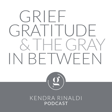
Sibling Grief Unveiled: Stories, Struggles, and Strength with Annie Sklaver Orenstein
ANNIE SKLAVER ORENSTEIN is a qualitative researcher, oral historian, and storyteller who has spent over a decade collecting stories from people around the world. Her work has been featured on NBC Nightly News, Comedy Central, Huffington Post, Politico, TIME, and Mother.ly. In 2020, driven by a desire to share these stories beyond the walls of corporate America, Annie founded Dispatch from Daybreak, a collection of letters written by womxn to their earlier selves. She lives in Connecticut with her husband, children, dog, and chickens.
After her brother was killed by a suicide bomber in Afghanistan, Annie Sklaver Orenstein was heartbroken and unmoored. Standing in the grief section of her local bookstore, she searched for guides on how to work through her grief as a mourning sibling—and found nothing.
More than 4 million American adults each year will lose a sibling, yet there isn't a modern resource guide available that speaks directly to this type of grief that at times can be overshadowed by grieving parents and spouses and made even more difficult by the complexities of sibling dynamics.
In ALWAYS A SIBLING: The Forgotten Mourner's Guide to Grief (Hachette Go, 9780306831492, 5/28/24, 272 pp, HC, $30), Annie uses her own story and those of others to create the empathic, thoughtful, practical resource that she sought. Divided into three sections: With, Without, and Within, it creates a framework that enables the reader to ground themselves in order to process and validate this often overlooked grief. Annie guides readers to capture the memories and emotions of life with their now-deceased sibling, then moves to addressing the grieving process in detail as they navigate life without them. Ultimately, readers will find ways to experience their sibling's presence within themselves and acknowledge their legacy.
With practical strategies rooted in proven grief processing techniques, trauma recovery, and psychoanalysis, ALWAYS A SIBLING supports mourners through the unique experience of sibling loss.
Key Subjects Covered:
- The historical significance of mourning rituals and how they validated grief in public spaces.
- The "dual loss" of sibling grief, where family dynamics and parental relationships inevitably shift.
- Annie's reflections on the societal minimization of grief and the pressure to move on quickly.
- The psychological weight of generational trauma and anticipatory grief in parenting.
- How Annie’s research and interviews with over 350 individuals informed the creation of her book.
- The Mourners User Manual (M.U.M.) as a tool for navigating grief thoughtfully.
https://www.annieorenstein.com/
Contact Kendra Rinaldi https://www.griefgratitudeandthegrayinbetween.com/


